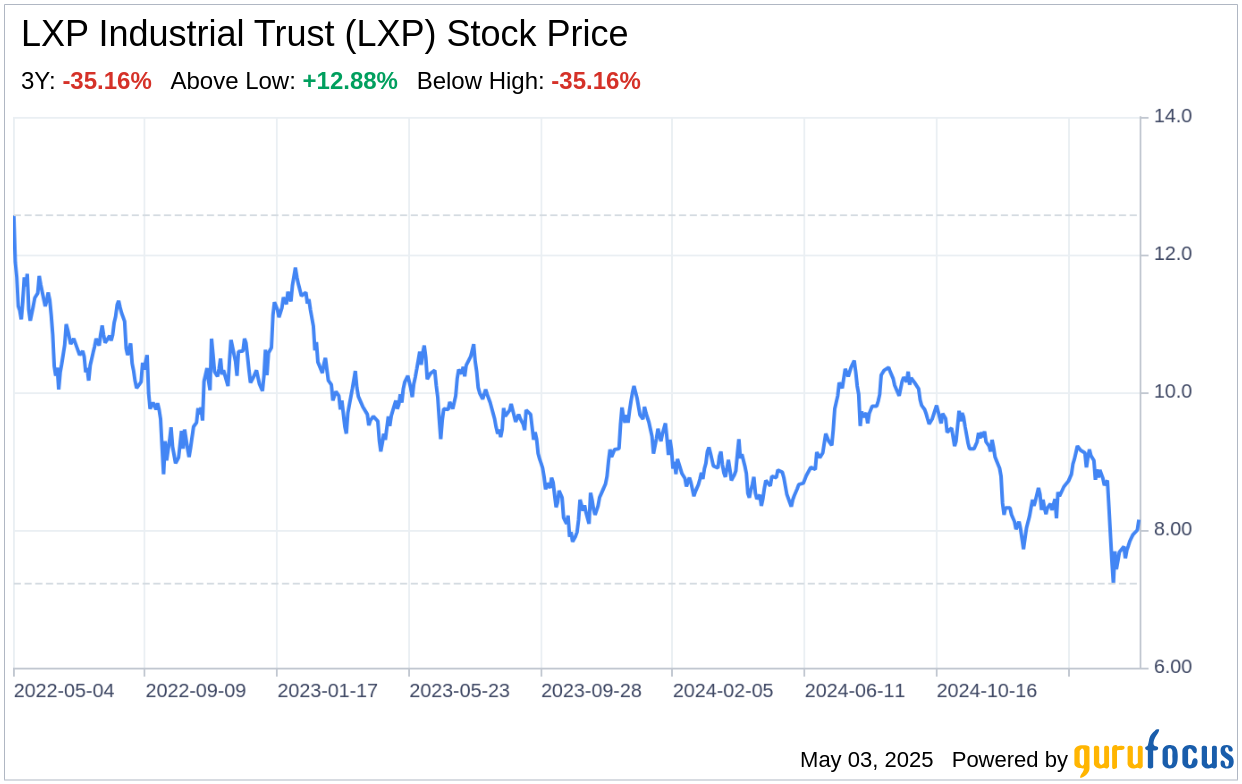LXP Industrial Trust (LXP, Financial), a real estate investment trust specializing in single-tenant properties and land across the United States, has demonstrated financial resilience and strategic growth in its latest 10-Q filing dated May 1, 2025. The company's financial overview for the quarter ended March 31, 2025, reveals a significant increase in net income attributable to common shareholders, rising from a loss of $1,931 thousand in 2024 to a profit of $17,279 thousand in 2025. This turnaround is largely attributed to a robust increase in rental revenue, from $85,207 thousand to $87,893 thousand, and a substantial gain on the sale of real estate amounting to $24,635 thousand. Despite facing depreciation and amortization expenses, property operating costs, and general and administrative expenses, LXP's strategic dispositions and development projects have contributed to a comprehensive income of $15,768 thousand, recovering from a comprehensive loss of $1,329 thousand in the previous year. The company's adept management of interest rate swaps and debt obligations reflects a prudent financial strategy, positioning LXP for sustainable growth and investor confidence.

Strengths
Robust Rental Revenue Growth: LXP Industrial Trust (LXP, Financial) has demonstrated a solid market position through its consistent growth in rental revenue. The recent 10-Q filing shows an increase from $85,207 thousand in 2024 to $87,893 thousand in 2025, indicating a strong demand for LXP's properties and a testament to the company's ability to attract and retain tenants. This growth is a direct reflection of LXP's strategic property selection and effective tenant management, which have contributed to a stable and growing income stream.
Strategic Asset Management: LXP's proactive approach to asset management is evident in its strategic dispositions and development projects. The gain on the sale of real estate of $24,635 thousand not only bolsters the company's financials but also demonstrates its ability to capitalize on market opportunities and optimize its property portfolio. This strategic realignment allows LXP to focus on high-potential properties and enhances its capacity for future growth.
Weaknesses
Depreciation and Operating Costs: While LXP Industrial Trust (LXP, Financial) has shown strong revenue growth, it also faces significant depreciation and amortization expenses, as well as property operating costs. These expenses, totaling $50,512 thousand and $17,129 thousand respectively for the quarter, highlight the ongoing costs associated with maintaining and operating a large portfolio of properties. These costs can impact net income and reduce funds available for reinvestment or distribution to shareholders.
General and Administrative Expenses: LXP's general and administrative expenses have increased from $9,493 thousand in 2024 to $10,390 thousand in 2025. This rise in overhead costs may indicate a need for more efficient operations and cost management strategies. While these expenses are necessary for the day-to-day running of the company, keeping them in check is crucial for maintaining profitability and competitive edge.
Opportunities
Market Expansion: LXP Industrial Trust (LXP, Financial) is well-positioned to capitalize on the growing demand for industrial real estate, particularly in the e-commerce and logistics sectors. With a strategic focus on Class A warehouse and distribution facilities, LXP can leverage its expertise to expand its portfolio in key markets, potentially driving further revenue growth and diversification of its tenant base.
Development Projects: LXP's ongoing development arrangements, with an aggregate investment of $17,500 thousand, present significant opportunities for growth. These projects, once completed, can enhance the company's asset base and generate additional rental income. LXP's ability to manage these developments effectively will be crucial in realizing their full potential and strengthening its market position.
Threats
Interest Rate Volatility: LXP Industrial Trust (LXP, Financial) is exposed to interest rate risk, as evidenced by its use of interest rate swaps. While these financial instruments are used to manage cash flow volatility, sudden changes in interest rates can impact the cost of debt and the value of interest rate swaps. This could affect LXP's financial performance and its ability to secure favorable financing for future projects.
Economic Uncertainties: Macroeconomic factors, such as economic downturns or shifts in the industrial real estate market, pose potential threats to LXP. These uncertainties can affect tenant stability and demand for industrial space, which in turn could impact rental revenues and property valuations. LXP must remain vigilant and adaptable to navigate these challenges effectively.
In conclusion, LXP Industrial Trust (LXP, Financial) exhibits a strong financial foundation with notable growth in rental revenue and strategic asset management. However, the company must address its rising operating and administrative costs to maintain profitability. Opportunities for expansion and development projects offer promising avenues for growth, while interest rate volatility and economic uncertainties present challenges that require careful management. Overall, LXP's strategic approach and financial acumen position it well to capitalize on market opportunities and mitigate potential risks.
This article, generated by GuruFocus, is designed to provide general insights and is not tailored financial advice. Our commentary is rooted in historical data and analyst projections, utilizing an impartial methodology, and is not intended to serve as specific investment guidance. It does not formulate a recommendation to purchase or divest any stock and does not consider individual investment objectives or financial circumstances. Our objective is to deliver long-term, fundamental data-driven analysis. Be aware that our analysis might not incorporate the most recent, price-sensitive company announcements or qualitative information. GuruFocus holds no position in the stocks mentioned herein.
